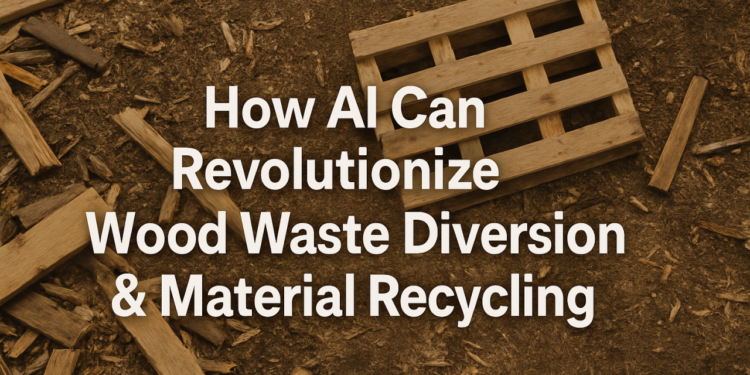AI wood waste diversion is revolutionizing the way we handle the ever-growing problem of wood waste in an environmentally conscious manner. With advances in technology, startups like Woodchuck are leveraging artificial intelligence to efficiently sort and process wood waste, transforming it into valuable biomass for renewable energy. This innovative approach not only addresses wood waste management challenges but also significantly contributes to sustainable energy solutions in the construction sector. By diverting millions of tons of construction waste from landfills each year, AI wood waste diversion initiatives promote a greener, more sustainable future. As industries strive to meet strict sustainability goals, integrating renewable energy technology into waste management practices becomes crucial for reducing both costs and environmental impact.
The emergence of intelligent waste management systems, notably in wood waste processing, marks a significant step towards sustainable resource utilization. These advanced methodologies focus on creating energy from discarded materials, particularly from the construction industry, which is often responsible for substantial waste generation. By employing smart sorting technologies, companies can enhance their biomass processing capabilities and facilitate efficient construction waste diversion. This shift towards eco-friendly operations aids businesses not only in lowering operational costs but also in making a positive impact on the environment. Embracing innovative techniques in waste management is essential for promoting renewable energy and fostering sustainable business practices.
The Importance of AI in Wood Waste Diversion
AI-driven wood waste diversion technologies are revolutionizing the landscape of sustainable waste management. Companies like Woodchuck are leveraging artificial intelligence not only to identify and sort wood waste efficiently but also to optimize the overall biomass processing system. This integration of technology is key in addressing the challenges posed by traditional wood waste management processes, which often lead to significant environmental repercussions, including increased landfill use and greenhouse gas emissions. As industries become more aware of their environmental impact, the demand for innovative solutions is skyrocketing.
Using AI for wood waste diversion enables stakeholders—including manufacturers and construction firms—to process waste more effectively and reduce overall costs. By accurately categorizing and managing wood waste, the AI platform helps these companies implement sustainable energy solutions that contribute positively to the clean energy grid. Enhanced analytics provide insights that support better decision-making, helping to track CO2 emissions avoided and renewable energy produced. This transformative approach not only fosters environmental stewardship but also drives economic growth in alignment with sustainability goals.
Sustainable Energy Solutions via Biomass Processing
Biomass processing is emerging as a critical component in sustainable energy solutions, especially when it comes to utilizing wood waste. Through innovative platforms like Woodchuck, biomass can be effectively converted into renewable energy, thereby reducing reliance on fossil fuels and supporting cleaner energy objectives. The wood waste that would traditionally end up in landfills can be redirected to biomass facilities, where it is transformed into energy resources such as heat and electricity. This not only increases energy efficiency but also aligns with broader goals of reducing our carbon footprint.
The development of technologies for effective biomass processing underpins the future of renewable energy technology. With the capability to produce clean energy from wasted materials, such systems have the potential to drastically change the construction industry’s approach to resource management. Construction waste diversion strategies that incorporate biomass processing are essential for promoting sustainability within the industry. By doing so, companies can diminish their environmental impact while also enhancing their bottom line, showcasing a compelling model of how sustainability and profitability can coexist.
Reducing Construction Waste and Costs
The construction industry is one of the largest contributors to waste generation, with millions of tons of materials—especially wood—finding their way to landfills each year. Woodchuck’s AI platform positions itself as a vital solution to this pressing issue by offering tools that prevent construction waste and drive cost savings for companies. By implementing advanced sorting and processing capabilities, businesses can minimize the amount of waste they need to haul away, leading to substantial reductions in disposal costs. This not only benefits the environment but also enhances operational efficiency.
In addition to waste reduction, Woodchuck’s technology provides clients with comprehensive reports that validate their sustainability efforts. By tracking every step of the diversion process, companies can clearly demonstrate the effectiveness of their waste management strategies. As sustainability becomes a crucial marketing point for construction firms seeking contracts, the ability to show tangible results—such as CO2 emissions saved and energy produced—becomes a competitive advantage. This transparency reinforces the industry’s commitment to building a more sustainable future.
The Role of Public-Private Collaboration in Sustainability
As highlighted by Gov. Gretchen Whitmer at Woodchuck’s launch event, public-private collaboration plays a significant role in advancing sustainability initiatives. Partnerships between government entities and innovative startups like Woodchuck can foster advancements in technology and environmental practices. By pooling resources, expertise, and knowledge, stakeholders can create more robust solutions to navigate environmental challenges. This collaboration not only accelerates the development of sustainable technologies but also amplifies community engagement in sustainability efforts.
Moreover, such partnerships signal to the broader market that sustainability is not merely a corporate responsibility but a collective mandate that encompasses various sectors. When businesses and local governments work together toward common goals—like reducing landfill waste and promoting clean energy generation—there is a stronger chance of achieving lasting change. Events supporting such initiatives can inspire local communities and businesses, reinforcing the narrative that sustainable innovation is within reach and beneficial for all.
AI Innovations Driving Eco-Friendly Solutions
Innovations in AI are at the forefront of creating eco-friendly solutions across various sectors, particularly in waste management. Companies like Woodchuck exemplify how AI can enhance the efficiency of managing wood waste, which has traditionally posed significant environmental challenges. Through advanced technologies, businesses are now able to sort, analyze, and process wood waste with unparalleled precision, mitigating the ecological impact associated with lumber production and disposal. This is pivotal as more companies seek to set benchmarks for sustainable practices.
Furthermore, the application of AI in waste management extends beyond environmental benefits; it also offers economic advantages. Reducing waste hauling costs by up to 30% allows construction and manufacturing operations to allocate resources more effectively, driving profitability while adhering to sustainability protocols. This paradigm shift not only helps companies meet their environmental obligations but enhances their operational frameworks through a more intelligent approach to resource management.
Impact on Local Communities and Disaster Recovery
The role of innovative companies like Woodchuck transcends traditional waste management by also contributing to disaster recovery efforts. For instance, following major storms that produce significant wood debris, the company’s technology can help municipalities efficiently divert fallen timber from landfills to biomass processing facilities. This not only aids in faster recovery efforts but also turns disaster debris into a valuable renewable energy source. Such initiatives underscore the capacity of AI-driven solutions to adapt to diverse challenges, supporting community resilience at crucial times.
By engaging with local municipalities during recovery operations, Woodchuck demonstrates the tangible benefits of collaboration between technology and community needs. The ability to swiftly process storm-damaged wood into biomass reinforces the premise that sustainability can play a vital role during emergencies. Moreover, this proactive approach helps create awareness about the potential of wood waste even in adverse situations, ultimately promoting broader acceptance of sustainable practices within the community.
Transforming Waste into Renewable Energy
The transformation of wood waste into renewable energy epitomizes the essence of sustainability in the modern economy. Companies like Woodchuck are at the forefront of this transformative movement, harnessing advanced AI technology to turn what was once seen as mere waste into valuable energy resources. By diverting wood waste from landfills and converting it into biomass, these companies are not only facilitating cleaner energy solutions but also contributing to a reduced carbon footprint across various industries. This conversion process contributes directly to the renewable energy grid, showcasing a feasible pathway to cleaner energy production.
Moreover, the biomass generated from wood waste can be utilized across a spectrum of applications, from heating residential spaces to powering commercial facilities. This versatility maximizes the value extracted from wood waste, promoting a circular economy where resources are continually reused and repurposed. As awareness of the benefits of biomass processing grows, it stands to become an essential element in the toolkit for sustainable energy solutions, highlighting the intersection of technology, waste management, and renewable energy generation.
Future Trends in Wood Waste Management
The future of wood waste management promises significant advancements spurred by technological innovations and increased awareness of sustainability imperatives. As companies like Woodchuck continue to develop their capabilities, we can expect an escalation in AI-driven solutions that enhance the sorting and processing of wood waste across various sectors. This surge in technological integration will likely lead to more streamlined operations, reduced waste generation, and improved efficiency in biomass processing. Industries will continue to adapt to these innovations, paving the way for increased market acceptance and usage of sustainable practices.
Additionally, the growing focus on sustainability in corporate strategies means that wood waste management will continue to rise in prominence. Organizations will seek out partnerships that integrate advanced renewable energy technologies to meet consumer demand for eco-friendly solutions. By embracing such practices, companies will not only fulfill regulatory requirements but will also contribute positively to environmental conservation efforts, driving future trends in sustainable business practices. The proactive approach to managing wood waste could soon become a standard operating procedure, embedding sustainability deeply into industry culture.
Frequently Asked Questions
What is AI wood waste diversion and how does it work?
AI wood waste diversion utilizes artificial intelligence to identify, sort, and process wood waste efficiently. The technology minimizes waste from construction by converting it into biomass, which can be used for renewable energy generation, thus supporting sustainable waste management practices.
How does AI wood waste diversion contribute to sustainable energy solutions?
AI wood waste diversion contributes to sustainable energy solutions by transforming discarded wood into biomass fuel. This process reduces landfill waste while generating clean energy, aligning with eco-friendly goals in construction and manufacturing industries.
What role does biomass processing play in wood waste management?
Biomass processing is integral to wood waste management as it converts unwanted wood materials into valuable energy resources. By effectively processing this waste, companies can lower costs and help achieve sustainability objectives by utilizing renewable energy technologies.
How can construction companies benefit from AI wood waste diversion?
Construction companies benefit from AI wood waste diversion by reducing operational costs related to waste hauling by up to 30%. Additionally, they gain compliance with sustainability requirements through detailed tracking of diverted materials and energy produced.
What impact does AI wood waste diversion have on renewable energy technology?
AI wood waste diversion enhances renewable energy technology by improving the quality and efficiency of biomass production. This innovation helps create clean energy from waste, thereby contributing to a greener energy grid and reducing reliance on fossil fuels.
What are the environmental benefits of using AI in wood waste management?
The environmental benefits of using AI in wood waste management include reducing landfill waste, minimizing carbon emissions, and promoting the development of renewable energy. This technology not only diverts waste but also ensures that it is processed better, turning potential waste into valuable energy resources.
How does Woodchuck use AI for wood waste diversion?
Woodchuck employs AI to identify and sort wood waste based on various parameters, improving the efficiency of biomass processing. This innovative approach enables the company to maximize waste diversion and convert discarded wood into clean energy, supporting sustainability in the industry.
What types of businesses can benefit from AI wood waste diversion?
Businesses within the construction, manufacturing, and energy sectors can greatly benefit from AI wood waste diversion. By reducing waste management costs and enhancing sustainability, these companies can meet increasing demands for environmentally responsible practices.
Can AI wood waste diversion assist in disaster recovery efforts?
Yes, AI wood waste diversion can assist in disaster recovery efforts by efficiently processing large amounts of wood debris, such as fallen timber from storms. This not only helps in diverting waste from landfills but also aids in converting it into biomass for renewable energy.
What makes Woodchuck’s platform unique in the wood waste management industry?
Woodchuck’s platform stands out due to its advanced AI capabilities that enable precise sorting and processing of wood waste, coupled with a transparent tracking system. This combination optimizes biomass quality and production, setting a new standard for sustainability in the wood waste management industry.
| Key Point | Details |
|---|---|
| Funding Raised | Woodchuck secured $3.75 million in seed funding led by Mason Fink and supported by NorthStar Clean Energy, Alloy Partners, and Beckett Industries. |
| Technology | The AI platform identifies, sorts, and processes wood waste, converting it to biomass for clean energy production. |
| Environmental Impact | Woodchuck aims to reduce landfill waste and support sustainability efforts by processing construction waste. |
| Cost Savings | The platform can cut waste-hauling costs for companies by up to 30% while improving biomass quality. |
| Community Engagement | Woodchuck participated in disaster recovery efforts post-ice storm, diverting wood debris into biomass processing. |
| Official Launch | Woodchuck officially launched in September 2024 and held a grand opening event in June 2025. |
Summary
AI wood waste diversion is making significant strides in sustainability efforts, as demonstrated by the launch of Woodchuck, an innovative startup that recently raised $3.75 million in seed funding. The company’s AI technology not only identifies and processes wood waste but also transforms it into valuable biomass energy. By reducing waste and promoting economic growth, Woodchuck exemplifies how technological advancements can contribute positively to both environmental goals and community engagement. With a commitment to scaling operations and enhancing sustainability in the construction and manufacturing sectors, Woodchuck is positioned to lead in the wood waste diversion space.











